There’s something undeniably soft about the phrase “much love” that cuts through the noise of our daily chats and conversations. I’ve noticed it appearing everywhere—in social media posts, goodbye messages, and replies that need just the right amount of warmth without crossing invisible boundaries. The beauty of these two simple words lies in their flexibility: they carry depth while remaining non-pressuring, making the recipient feel valued and appreciated without the weight of more intense declarations. Whether you’re texting friends, sending supportive gestures to family, or crafting heartfelt notes to partners, “much love” occupies this perfect middle ground between formal sign-offs like “sincerely” and something more dramatic. It’s a gentle reminder that someone matters, that they’re connected to you in ways that feel meaningful.
What strikes me most about this phrase is how it adapts to the tone of any relationship. In romantic exchanges, it adds tenderness without demanding immediate reciprocation; in friendly conversations, it brings comfort and closeness without seeming overly emotional; and in supportive messages during tough times, it offers encouragement and a sense of being safe. I’ve used it myself when words like “love” felt too intense for the moment, but something casual like “take care” didn’t capture the warmth I wanted to convey. The phrase works beautifully across distance, carrying blessings and affection through screens and world-spanning miles. It’s become part of our human vocabulary in the digital age, sitting comfortably alongside emojis and abbreviations that color our written presence.
The emotional intelligence of “much love” reveals itself in how it makes people feel appreciated without overwhelming them. It’s sweet and reassuring, offering care without crossing into territory that might make someone uncomfortable. In my experience writing and receiving countless messages, I’ve learned that the best phrases are those that honor where someone is emotionally and “much love” does exactly that. It acknowledges closeness while respecting personal space, creates connection without pressure, and wraps feelings in a kind of softness that today’s fast-paced media posts and rapid-fire texts desperately need. The heart of this expression beats with meaningful intention, transforming even the briefest goodbye into something that lingers warmly long after the conversation ends.

“Much Love” Meaning & Usage
I’ve watched “much love” evolve into one of those rare phrases that manages to bridge the gap between deep emotional connection and safe casualness in modern communication. When you’re expressing warmth to someone, this phrase delivers affectionate feelings without the intense weight that declarations of love can carry and that’s precisely why people gravitate toward it. The person receiving these words gets to interpret them through the lens of their own relationship with you, whether that’s romantic, platonic, or somewhere in between. In my years of crafting messages and studying how people connect through texting, Instagram captions, and supportive notes, I’ve noticed that “much love” creates an emotionally safe space for both sender and receiver.
What makes this expression so versatile is its soft tone that works across countless scenarios. Picture cheering up a friend after a stressful day with a sweet message that says “thinking of you, much love” it’s comforting without being overwhelming. Or imagine sending farewell messages to a long-distance partner where you want that reminder of affection but something less formal than traditional romantic sign-offs. The phrase essentially functions like a hug through text, short yet packed with comforting sentiment. I’ve used it myself when boundaries felt important but kindness needed to shine through, and the softness it brings never fails to make the recipient feel valued.
The usage of “much love” has become deeply rooted in how we maintain friendships and relationships across digital platforms. When someone sends supportive replies during tough times, these two words carry positive warmth that reminds people they’re not alone. The beauty lies in how it honors emotional closeness without demanding anything in return no pressure for the receiver to match your energy or escalate the commitment. Whether you’re writing Instagram captions about your chosen family or ending a text conversation with someone who needs to hear they’re appreciated, “much love” adapts beautifully. It’s become shorthand for care that transcends the limitations of modern communication, proving that even in our abbreviated digital world, we can still create genuine connection through thoughtfully chosen phrases.
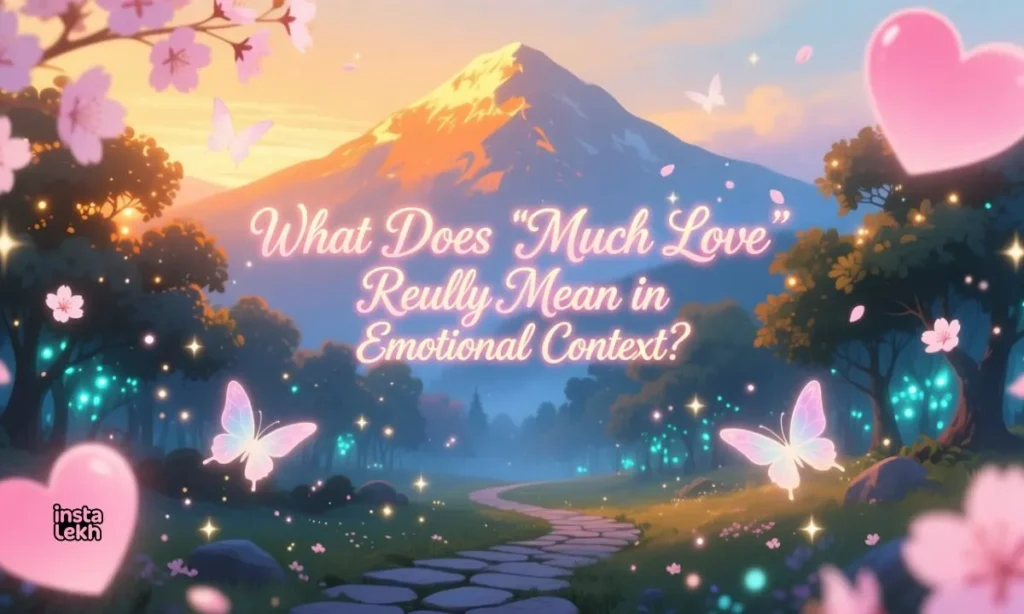
What Does “Much Love” Really Mean in Emotional Context?
The emotional context behind “much love” reveals layers that go far beyond a polite closing. When someone sends you this phrase, they’re doing something quite powerful they’re building a bridge between people that reassures the receiver they’re appreciated and safe without creating pressure or expectation. I’ve seen this message work like a miniature love-language in itself, carrying tenderness, understanding, and loyalty in just two words. The sender is essentially offering support and comfort through what feels like a verbal hug, a reminder that even in a difficult time or challenging moment, you’re not alone. What strikes me most about this phrase is how it’s become so popular precisely because it honors attachment and connection without being overwhelming to the person receiving it.
In my experience analyzing how people communicate feelings, “much love” operates in these deeper spaces where the heart needs acknowledgment but can’t handle anything too heavy. Think about situations where a gentle declaration matters more than romantic love—maybe you’re expressing care for someone going through loss, or showing respect and affection to a friend who’s emotionally raw. The beauty of these words is that they make the listener feel emotionally present in your thoughts without demanding reciprocation. It’s a breathable, safe step toward expressing deeper feelings without the weight of traditional declarations. The phrase creates closeness that’s soft rather than suffocating, personal yet not invasive.
The true emotional meaning of “much love” lies in how it balances warmth with distance and I don’t mean that negatively. Sometimes a casual goodbye needs more heart than “see you later” but less promise than “I love you.” This phrase fills that gap perfectly, functioning as both a reminder of your presence and an acknowledgment of kindness that exists in your relationship. Whether the context is ending a conversation, supporting someone through turmoil, or simply maintaining connection across physical distance, “much love” delivers exactly what the moment requires. It’s become this gentle, powerful tool for showing up emotionally without overwhelming the space between people
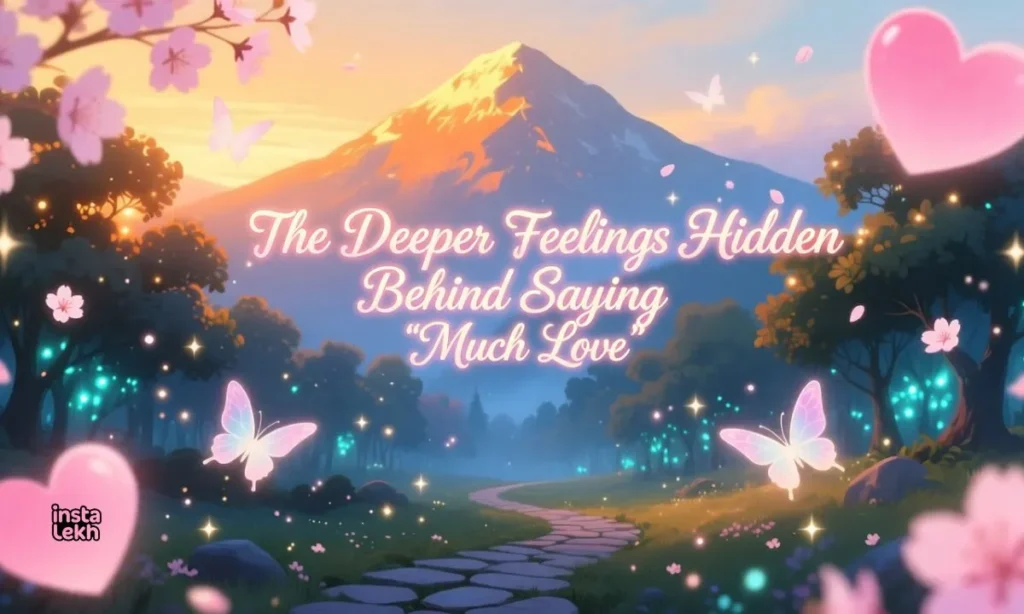
The Deeper Feelings Hidden Behind Saying “Much Love”
There’s something fascinating about how “much love” appears so simple on the surface, yet carries these deeper emotional layers that only become clear when you pay attention to when it’s spoken and how people feel after hearing it. In my work exploring emotional psychology, I’ve noticed that this phrase often functions as a gentle substitute for affection that’s growing quietly beneath the surface rooted in care, respect, and friendship that might be evolving into something more. These soft phrases allow us to express closeness and vulnerability through a safe doorway to connection without fully saying what we’re not yet ready to confess. When someone tells you they see you, feel connected to you, or want to hold space for you but feels hesitant to say “love” directly, “much love” becomes that heartfelt gesture that can matter enormously regardless of the relationship stage.
What most people don’t realize is that this phrase sometimes acts as a shield for unspoken affection a way of secretly telling the person you’re addressing that they hold a special place while choosing a lighter expression that feels safe. I’ve watched friends use it when they wanted to reveal the depth in their heart without risking rejection, offering this quiet hint through a message that essentially says “I’m waiting until you’re ready for feelings to be fully named.” The beauty is that it can be received without pressure, yet most people instinctively understand the difference between a casual sign-off and one carrying deeper feeling. The sweetness and intimate truth behind “much love” often lies in what isn’t said aloud it’s offering a piece of your heart wrapped in softness, hoping the recipient will feel everything you can’t quite name yet.
This verbal alternative to direct confessions creates these meaningful moments where people connect on emotional levels while helping and supporting each other emotionally without demanding definitions. I’ve used it myself when closing a conversation where traditional goodbyes felt inadequate, where the unspoken weight of affection needed acknowledgment but full declarations seemed premature. The phrase becomes this gentle gesture that honors whatever’s growing between people while maintaining that safe space for feelings to develop naturally. It’s a quiet, heartfelt way of saying “you matter to me” without forcing either person to define exactly how much or in what way letting the deeper layers reveal themselves when the time is right.
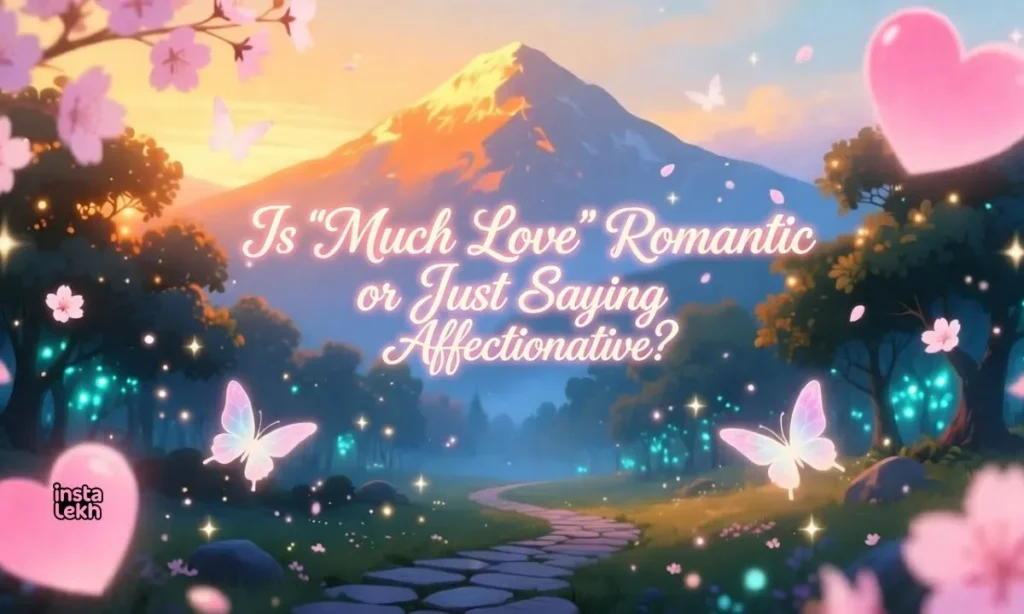
Is “Much Love” Romantic or Just Affectionate?
One of the main reasons people wonder about this phrase is that “much love” exists in this beautifully ambiguous space where the tone can be both affectionate and romantic depending entirely on who’s speaking and what relationship they’re nurturing. Unlike bold declarations of love that demand clear romantic situations, this softer emotional expression creates space for interpretation it can be purely friendly and caring while also leaving room for something deeper. I’ve seen it delivered between friends where it expresses comfort, loyalty, and appreciation with zero romance, functioning as a supportive message that says “I cared about your well-being” and “you matter to me” in ways that embrace platonic connection. Yet I’ve also watched the same words become incredibly reassuring when whispered or texted by someone whose hand you want to hold, where the softness hints at attraction and chemistry waiting beneath the surface.
The meaning shifts dramatically based on context that’s the thoughtful beauty of this phrase. When sent as a casual sign-off to multiple people, it’s clearly a version of general care and warmth without romantic undertones. But when it arrives as a deeper, more personal whisper to one specific someone, it can feel like an invitation to something sweeter and more intimate. The tone changes everything: a quick “much love!” after group plans reads as friendly, while “much love” sent late at night with a thoughtful follow-up message carries weight that’s hard to ignore. What I’ve learned from both sending and analyzing these exchanges is that the phrase deliberately avoids a strict label, keeping the door open for people to feel what they need to feel while giving both parties space to receive it at their own pace.
The genius of “much love” lies in how it remains emotionally safe and meaningful regardless of whether the answer to “is it romantic?” is yes or no. It honors a friendly bond while also growing quietly alongside connections that might be becoming deeper than what can be spoken aloud. I’ve used it with friends where platonic affection runs strong, and I’ve used it in situations where unspoken romance was softly building but neither person was ready to name it directly. The phrase doesn’t force anyone to choose between categories it simply acknowledges that someone has become important to you, whether that importance lives in friendship, budding attraction, or the caring, supportive, reassuring space where both can coexist.
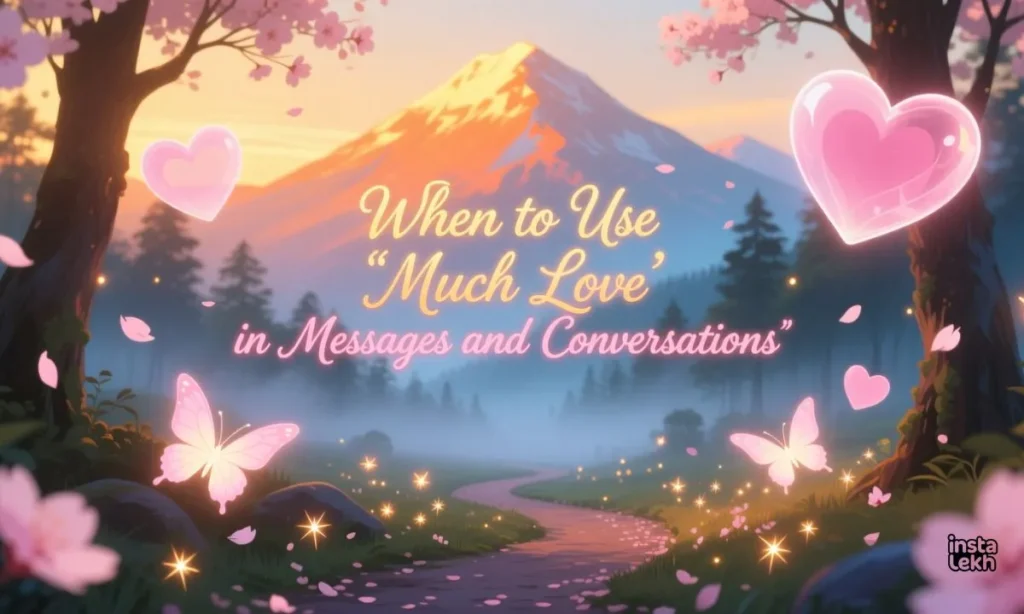
When to Use “Much Love” in Messages and Conversations
Knowing when to use “much love” in a message can transform something ordinary into something warmer and more personal, making your communication feel emotionally considerate rather than robotic. This phrase shines brightest in situations where you want to express care and closeness without tipping into anything too intense or dramatic and I’ve found that people naturally gravitate toward it when ending a conversation that carries emotional value. Think about supporting a friend through a tough day, celebrating someone’s achievement, or sending blessings during a significant moment in their life. For long-distance friendships and relationships where physical presence isn’t possible, this phrase becomes crucial reassurance, offering words that serve as a soft anchor during moments when distance feels heavy.
The real magic happens when you deploy “much love” as a reminder of connection in meaningful contexts like thank-you messages, comfort notes, or heartfelt check-ins where your intention is ensuring the receiver feels seen and supported. I’ve watched it work beautifully in encouragement texts before serious events job interviews, medical appointments, difficult conversations where something motivational and uplifting matters but the phrase needs to carry warmth without pressure. It’s also perfect when traditional words like “take care” or “best wishes” feel too formal or distant for the level of intimacy you share. In online communities, support groups, and family chats, this expression helps maintain closeness across digital spaces where tone can otherwise feel cold.
What I’ve learned from years of crafting and analyzing messages is that “much love” works best when the relationship already has some foundation whether through shared history, ongoing conversation, or mutual support. It’s that gentle bridge between casual and deeply intimate, making it ideal for moments when you want your words to linger in someone’s heart just a bit longer. The phrase tells the receiver they’re not just another name in your contacts; they’re someone whose emotional well-being matters enough to send them off with something warm, personal, and genuinely considerate.
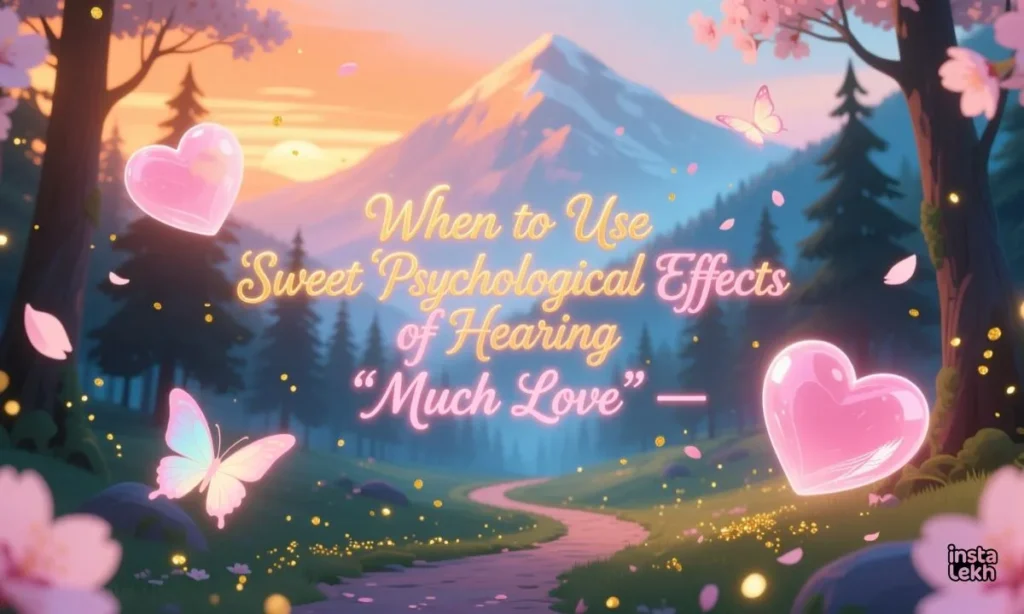
Sweet Psychological Effects of Hearing “Much Love”
Hearing “much love” creates this calming and uplifting psychological impact that goes far deeper than you might expect from such a short, gentle phrase. From an emotional perspective, this expression signals safety to the brain it tells us we’re cared for and not alone, which matters profoundly since human beings constantly seek reassurance through connection. The soft language triggers responses that reduce stress, loneliness, and the ache of distance, allowing the heart to relax when someone receives these words during a difficult or sensitive moment. Psychologists have found that affectionate wording like this actually boosts oxytocin, the bonding hormone that makes people feel closer and more secure in their friendships and relationships, essentially creating a subtle bond through words that communicate kindness without obligation.
What strikes me most about the psychological effects is how the receiver immediately feels valued, supported, and held by the message it improves self-worth in ways that signs off with clinical coldness never could. There’s this subconscious signal embedded in “much love” that whispers “you matter,” wrapping the recipient in warmth and serving as a reminder that they occupy space in someone’s thoughts. I’ve noticed this becomes especially powerful when people are feeling vulnerable, distant, or underappreciated the phrase functions as instant affirmation of belonging. In romantic situations, the effect gets even sweeter: it’s a whisper of intimate care that feels overwhelming yet never pressuring, that reassures while giving both people space for slow growth.
The mind registers the tenderness behind “much love” and reads it as genuine closeness regardless of its size or weight this phrase soothes, comforts, and connects the person to you through some of the simplest words available. What I’ve learned through studying communication patterns is that these two words gently make someone feel loved while softly acknowledging their presence in your emotional world. The beauty lies in how efficiently it delivers psychological comfort: no grand gestures required, just honest affectionate language that triggers all the right responses in the brain and heart simultaneously.
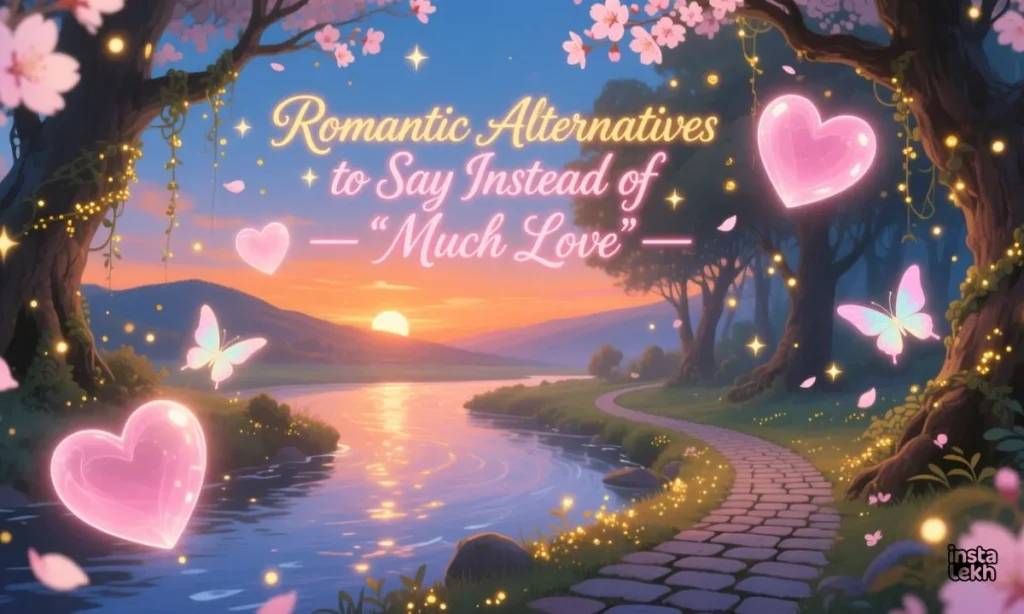
Romantic Alternatives to Say Instead of “Much Love”
When people want to express warmth beyond “much love” in romantic contexts, choosing something more emotionally expressive opens up these sweet alternatives that carry the same intention but feel deeper, softer, and more intimate in their closeness. I’ve experimented with countless phrases over the years, and what I’ve discovered is that affection becomes more unique to your style when you craft messages with gentle tenderness, especially in early romance where a growing connection needs acknowledgment without pressure. Phrases like “with all my heart” or “sending warmth” offer romantic weight, while “you mean more than you know” lets you hint at care without venturing into overly intense territory. These deeper expressions create space for vulnerability without demanding reciprocation.
Some of my favorite emotionally closer options include “you live in my heart,” “my love stays with you,” or the unexpectedly beautiful “you are my softness” each one strengthening connection while feeling more intimate and poetic than standard sign-offs. When I want something that wraps around someone like a quiet embrace, I’ll use “you’re wrapped in my affection” or “I keep you gently in my thoughts,” which bring this poetry and tender, lingering quality that sits quietly in the romantic heart. These phrases give you room to choose words that intend to communicate how someone occupies special space in your world. Even shorter, more subtle options like “all my love,” “warmth to you,” or “love always” shift the tone to lean into emotional closeness between two people who share something worth naming.
The real beauty of finding the right phrase lies in how the meaning gets received gentle yet deeply romantic alternatives create these soft pathways to connection and emotional intimacy that feel tender and respectful. While “much love itself” serves its purpose wonderfully, sometimes your heart needs language that mirrors the unique bond you’re building. I’ve learned that the most memorable messages are those where two people communicate affection in ways that feel authentically theirs, where words become personal signatures of how you hold each other in thought and feeling.

Heart-Melting Text Examples Using “Much Love”
One of the sweetest ways to truly understand the emotional tone of “much love” is to feel how it lands inside actual, real messages because texting is the most common space where this phrase gets written, and the sincerity behind it can soften even the hardest heart instantly. I’ve collected and crafted countless kinds of emotional, warmth-filled, gentle messages over the years, and what becomes clear is how these words transform something that might otherwise feel heavy or distant into something beautifully affectionate. Let me share some heart-melting text examples for different situations that demonstrate exactly how the phrase works its magic: “Thinking of you today. Stay safe, stay gentle. Much love” speaks volumes to someone navigating difficulty, while “You don’t have to face this alone—I’m here. Much love” offers concrete support wrapped in tenderness.
Messages like “Thank you for being my soft place in this world. I hope your tonight rests softly. Much love” can make ordinary days feel warm and cherished, reminding someone they’re appreciated beyond measure. When you know things are heavy for someone, try: “You’re stronger than you realize. Keep taking those little steps I’m with you. Much love.” For romantic contexts where you want to convey presence without overwhelming pressure, something like “Wishing you peace tonight. Can’t say it out loud yet, but you matter more than you know. Much love” creates emotional depth while respecting boundaries. In long-distance situations where physical affection isn’t possible, “We’re miles apart but you’re so close in my feeling and thoughts holding you there always. Much love” bridges geographical gaps beautifully.
What I’ve learned is that “much love” adapts seamlessly to whatever you need it to do it can soothe (“Rough day? I’m sending everything warm I have. Much love”), appreciate (“You make life better just by existing. Much love”), encourage (“Keep going, you’ve got this. Much love”), or even quietly flirt (“Can’t stop thinking about your smile. Much love”). The intention behind each message is what melts hearts, proving that care sent through simple, soft, sincerely felt language can reach directly into someone’s soul more powerfully than elaborate declarations ever could.
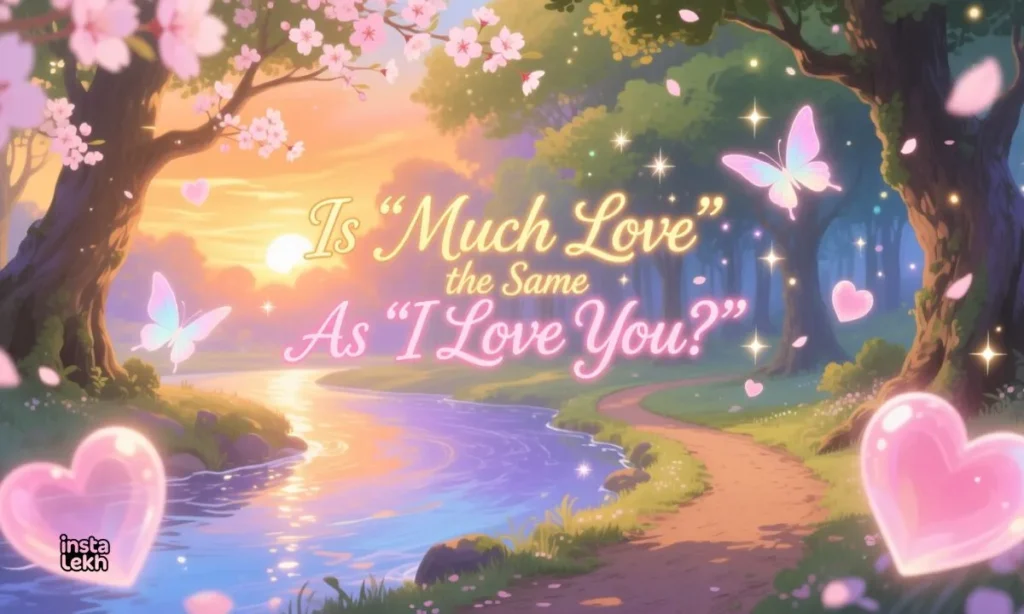
Is “Much Love” the Same As “I Love You”?
Many people wonder if “much love” is secretly just “I love you” in disguise, and the answer depends entirely on the emotional context, relationship, and depth of what’s being communicated. Technically, these phrases serve different purposes: “I love you” is a direct declaration of love, while “much love” functions as a softer expression of warmth, affection, and care. Yet the intention behind the words can feel remarkably similar when someone is not yet ready to confess romantic feelings openly but wants to communicate closeness through a safe placeholder. I’ve seen it work as a gentle bridge that offers emotional connection without the full confession, creating room for slow growth while saying “you’re important to me” at a comfortable pace.
In friendships, family, and other connections, “much love” stands independently as an affectionate way to show people matter and are dear to you it doesn’t hold the same weight as romantic declarations but carries its own tenderness. The difference lies in how each is presented: “much love” feels soft and almost harmless, while “I love you” in romantic situations brings expectation of stronger commitment, attachment, and belonging. What makes this interesting is that sometimes “much love” actually serves as a deeper claim on someone’s heart it’s a hint at feeling that doesn’t automatically equal full-blown declaration, but both hearts involved understand what’s being offered.
The beautiful truth I’ve discovered through years of analyzing how people communicate is that “much love” isn’t the same as “I love you,” but it can speak just as loudly about connection when presented in the right moment. One whispers softly where the other declares boldly both valid, both powerful, each serving the relationship exactly where it needs support. The phrase communicates what someone feels ready to share, whether that’s gentle affection that honors friendship or deeper feeling that’s slowly building toward something romantic. Neither is lesser; they simply honor different depths of emotional commitment and closeness.
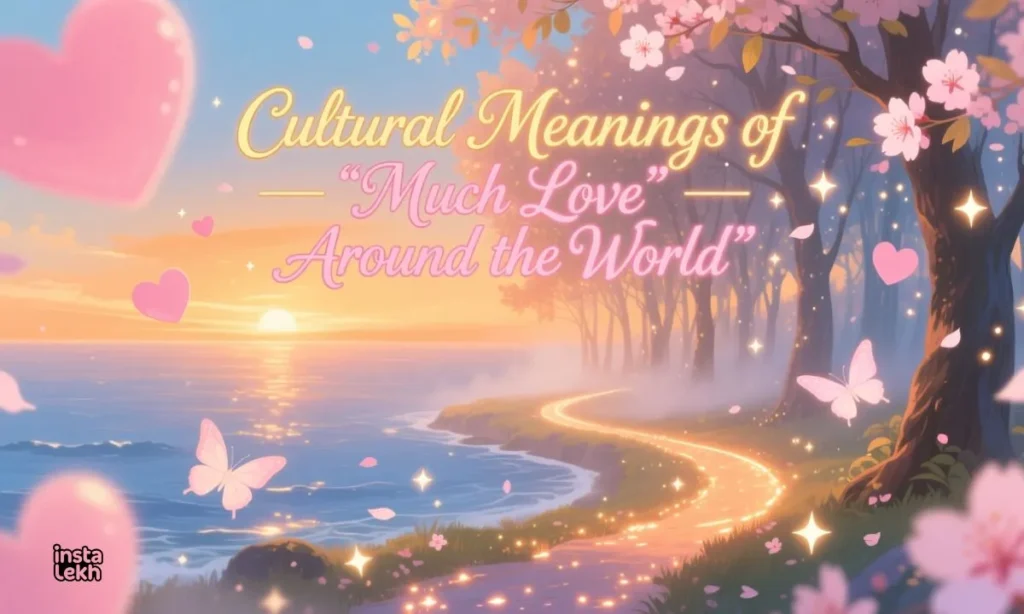
Cultural Meanings of “Much Love” Around the World
While “much love” is used commonly in English-speaking countries, its emotional meaning shifts beautifully across cultures as different phrases capture the same warmth and tenderness in ways that reflect local values. In Western contexts, particularly in supportive friendships, online communities, and family conversations, it serves as this gentle “you matter to me” statement rooted in kindness rather than romantic confession. Throughout the United States and UK, you’ll spot it constantly in messages and posts as a warm-hearted sign-off that feels both casual and meaningful. Meanwhile, in Latin American countries like Mexico, Brazil, and Spain, the spirit gets expressed through phrases like “con mucho cariño” or “con mucho amor,” which carry slightly deeper, more emotionally expressive weight because the language itself embraces touch, emotion that’s heard, felt, and shared more openly in daily interactions.
Asian cultures often lack a direct equivalent but favor softer, less direct expressions of care that emphasize consistency through actions rather than verbal declarations. In Japan and Korea, showing concern through gentle check-ins, gifts, or thoughtful gestures communicates the same feeling but with a completely different delivery style the sentiment exists, just wrapped differently. In Middle Eastern and South Asian regions like Pakistan, India, and the Arab world, you’ll encounter beautiful alternatives like “duaon mein yaad rakhna” (I’ll remember you in my prayers) or “bohot pyaar” (a lot of love) that blend sincerity with cultural values of spiritual concern and familial devotion.
What strikes me most after studying these cultural variations is how the core intention expressing warmth, tenderness, and care with softness and respect remains universal even when the exact words change. Whether someone in Tokyo shows love through consistent presence, a Brazilian friend signs off with “muito amor,” or an American texts “much love,” each culture has developed its own pathway to communicate “you’re important to me” in ways that feel authentic to their emotional landscape. The phrase itself may be uniquely English, but its spirit of gentle affection transcends language barriers entirely.

“Much Love” Meaning from a Guy or Girl
When a guy sends “much love,” the meaning often depends on his usual communication style and your existing relationship dynamic. In my experience analyzing messages between people, men typically use this phrase when they want to show care without appearing overly emotional or vulnerable it’s their way of saying “you’re important to me” while maintaining a comfortable level of emotional distance. If he’s sending it to a friend, it usually signals supportive, platonic affection and genuine appreciation for your presence in his life. However, when a guy uses “much love” consistently with one specific person, especially in romantic contexts or late-night conversations, it can hint at deeper feelings he’s not quite ready to confess directly. The tone shifts dramatically based on frequency and context a casual sign-off to multiple people reads differently than a heartfelt message meant just for you.
From a girl, “much love” carries similar warmth but often arrives with slightly more emotional transparency since women generally face less social pressure around expressing affection openly. When she uses this phrase, it’s frequently a genuine expression of care, tenderness, and connection whether toward friends, family, or someone she’s interested in romantically. I’ve noticed girls deploy “much love” strategically as a way to maintain closeness while respecting boundaries, making it perfect for friendships where emotional support matters deeply. In romantic situations, when a girl sends “much love” to a guy she likes, it often functions as a soft test a way to gauge his response and see if he reciprocates the feeling without risking outright rejection. The beauty lies in how it creates safe space for feelings to develop naturally.
The emotional intention behind “much love” from either gender ultimately reflects their comfort level with vulnerability and their assessment of where the relationship stands. A guy might use it because direct declarations feel too intense or dramatic for his communication style, while still wanting to communicate genuine affection. A girl might choose it because she wants to express deeper feelings without overwhelming the receiver or appearing too forward. What I’ve learned is that the phrase works as this gentle bridge between casual friendships and something more meaningful, allowing both guys and girls to signal emotional investment at their own pace. The context surrounding the words timing, frequency, accompanying messages reveals far more than the phrase itself.
Gender also influences how “much love” gets received and interpreted by others. When a guy says it, people might read it as either deeply sincere or casually friendly depending on his typical emotional expression patterns. If he’s normally reserved with feelings, “much love” carries significant weight; if he’s naturally affectionate with everyone, it might not signal romantic intention. Similarly, when a girl uses the phrase, some might interpret it as standard friendly warmth, while others recognize it as a subtle indicator of romantic interest. The challenge lies in understanding that the same words can carry vastly different meanings based on who’s saying them and what their emotional baseline looks like in other conversations.
What matters most isn’t whether a guy or girl sends “much love,” but rather what that phrase means within your specific connection. Pay attention to whether it appears in group messages or private conversations, whether it comes during difficult moments or celebratory ones, and how often it shows up compared to their communication with other people. I’ve found that “much love” reveals true emotional depth not through gender differences but through consistency, context, and the care someone demonstrates through actions beyond words. Both guys and girls use this phrase to express affection they feel ready to share the real question is whether you’re both speaking the same emotional language.
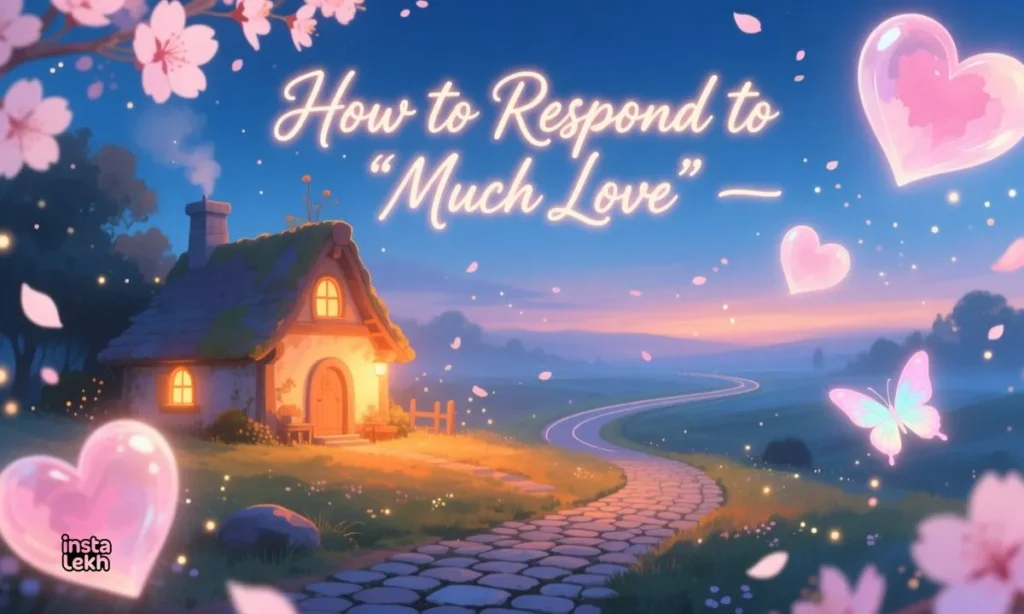
How to Respond to “Much Love”
Responding to “much love” depends entirely on what you want to communicate back and how you feel about the person who sent it. The most simple and safe response is to mirror their energy with something like “much love to you too” or “sending it right back,” which acknowledges their warmth without escalating or diminishing the emotional tone. I’ve used this approach countless times when I want to maintain the connection without overthinking the meaning behind their words it’s gentle, reciprocal, and keeps conversations flowing naturally. If you’re comfortable with the affection being expressed, matching their phrase shows you value the relationship and appreciate their thoughtfulness. This response works perfectly in friendships, family exchanges, and early-stage romantic situations where you’re still figuring out the dynamic.
When you want to respond with slightly more emotional depth, consider phrases like “you mean a lot to me too,” “sending warmth your way,” or “holding you in my thoughts.” These responses elevate the emotional intention while remaining soft and non-threatening, making them ideal when someone’s “much love” feels particularly heartfelt or arrives during a vulnerable moment. I’ve found that adding specific acknowledgment like “thank you for always being there, much love” creates meaningful reciprocity that strengthens bonds. If the message came during a difficult time, responding with “your support matters more than you know, much love back” validates their care while expressing genuine appreciation. These responses work beautifully when you sense the phrase carries deeper feelings than casual friendship.
For romantic contexts where you want to hint at your own growing feelings, your response can be slightly more intimate without full confession: try “you’re in my heart today, much love” or “thinking of you more than usual, much love always.” If you’re feeling brave and want to push the emotional boundaries gently, something like “you live in my thoughts, much love” or “more than much love, honestly” opens the door for deeper conversation. I’ve learned that when someone sends “much love” as a romantic feeler, they’re often hoping for a response that indicates mutual interest so if you feel the same, don’t be afraid to communicate that warmth clearly. The key is matching or slightly exceeding their emotional investment to show you’re present and interested.
If you’re uncertain about the meaning behind their “much love” or need time to process your feelings, a simple “appreciate you” or “same to you, friend” keeps things friendly without committing to a particular emotional level. Sometimes people send “much love” casually, and over-analyzing leads to unnecessary anxiety a straightforward response acknowledges their message without creating pressure. You can also respond with a warm emoji or heart symbol if words feel complicated in the moment. What I’ve discovered is that there’s no objectively wrong way to respond as long as your reply reflects your authentic feelings about the person and relationship. Honesty wrapped in kindness always trumps performative responses.
The beautiful truth about responding to “much love” is that the phrase itself invites flexibility it doesn’t demand grand gestures or perfectly crafted replies. Whether you respond with matching warmth, escalate slightly to test romantic waters, or keep things gentle and friendly, what matters most is that your response feels genuine to who you are and what you want from the connection. I’ve learned that the best responses communicate care while respecting boundaries, creating space for relationships to develop at their natural pace. Trust your instincts, respond from your heart, and let the conversation flow wherever it needs to go.
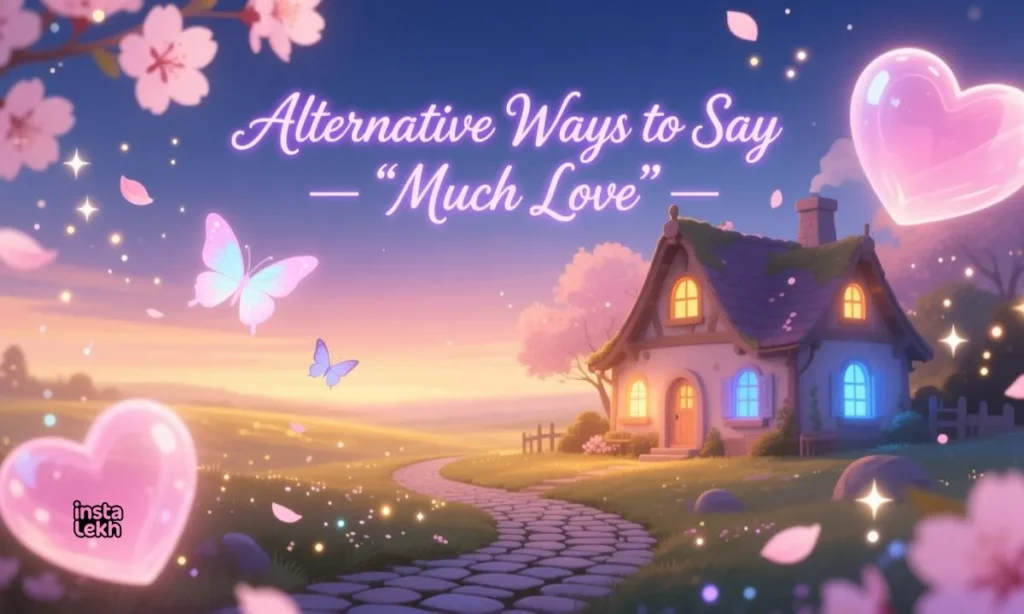
Alternative Ways to Say “Much Love”
Finding alternative ways to say “much love” opens up a world of expressions that can match your personal style, the relationship depth, and the emotional tone you want to convey. For friendships where you want to maintain warmth without romantic implications, phrases like “sending you warmth,” “take care of yourself,” or “thinking of you, friend” work beautifully. I’ve found that “big hug your way,” “wishing you peace,” and “stay safe and well” carry similar gentle affection while feeling slightly less loaded than “much love.” When you want something casual yet meaningful, try “all the best to you” or “keeping you in my thoughts” both acknowledge connection without excessive sentimentality. These alternatives respect boundaries while still showing you care about someone’s well-being.
For more romantic or emotionally expressive situations, you’ll want alternatives that carry deeper intention and intimacy. Phrases like “with all my heart,” “you’re wrapped in my affection,” or “my love stays with you” communicate romantic feelings more directly than “much love” while maintaining softness. I’ve used “you mean more than you know,” “you live in my heart,” and “holding you gently in my thoughts” when I wanted to elevate the emotional stakes without full confession. For long-distance relationships or when physical presence isn’t possible, “you’re close in my feeling and thoughts” or “sending love across the miles” bridges geographical gaps beautifully. These alternatives work when “much love” feels insufficient for the depth of what you feel.
If you prefer simple, understated expressions that avoid potential misinterpretation, consider phrases like “warmth to you,” “all my love,” or just “love always.” These alternatives strip away ambiguity while maintaining the gentle tone that makes “much love” so appealing. “Be well,” “sweet dreams,” and “rest softly” work perfectly as goodbye messages that show care without romantic expectation. I’ve noticed that sometimes the simplest words carry the most power “care about you,” “you matter,” or even just “❤️” can communicate genuine affection without requiring elaborate phrases. The beauty of these alternatives lies in their flexibility across different relationship types and emotional contexts.
For supportive messages during tough times, alternatives like “I’m here for you,” “sending strength and comfort,” or “you don’t have to face this alone” offer more specific emotional support than generic affection. When someone needs encouragement, try “believing in you,” “you’ve got this, and I’ve got you,” or “supporting you through every step.” I’ve learned that context-specific alternatives often resonate more deeply than catch-all phrases because they show you’re paying attention to what someone actually needs. “Proud of you,” “you’re stronger than you realize,” and “your courage matters” work when someone needs validation beyond standard affection. These alternatives transform generic warmth into targeted emotional support.
What I’ve discovered through years of crafting messages is that the best alternatives to “much love” depend on understanding your audience, the situation, and what you genuinely want to express. Some people respond better to poetic phrases like “you’re held softly in my heart,” while others prefer direct expressions like “appreciate you” or “grateful for you.” Cultural differences, personal communication styles, and relationship history all influence which alternatives land most effectively. The goal isn’t finding a perfect replacement but rather expanding your emotional vocabulary so you can communicate warmth, care, and affection in ways that feel authentic to you and meaningful to the receiver. Trust that whatever phrase you choose, if it comes from a place of genuine connection, it will resonate.
Frequently Asked Question
What does “much love” mean?
It’s a friendly and heartfelt way to express warmth, care, or affection.
When should I say “much love”?
Use it when ending a message or conversation to show kindness or emotional support.
Is “much love” romantic?
It can be, depending on the relationship and tone used.
What can I say instead of “much love”?
You can say “lots of love,” “with love,” or “warm regards.”
Does “much love” mean “I love you”?
No, it’s a gentler and less direct expression of affection.
Can I use “much love” with friends?
Yes, it’s perfect for close friends to show appreciation or support.
Is “much love” professional?
It’s better suited for personal messages rather than formal or work emails.
Why do people say “much love”?
They use it to convey warmth, positivity, and emotional closeness.
How do you reply to “much love”?
You can say “much love back,” “thank you,” or “love to you too.”
Can I use “much love” in texts?
Yes, it’s common in casual messages, social media posts, or supportive notes.
What feeling does “much love” express?
It expresses comfort, care, and emotional connection.
Is “much love” too personal?
It’s friendly and warm but not overly personal unless context makes it romantic.
Who can I say “much love” to?
You can say it to friends, family, or anyone you feel emotionally close to.
Does “much love” make a message sound softer?
Yes, it adds a gentle and caring tone to your message.
Is “much love” used globally?
Yes, people in many cultures use similar phrases to express affection and kindness.
Conclusion
“Much love” is a simple phrase that carries a lot of warmth and meaning. It’s a gentle way to show care, kindness, and emotional connection without sounding too heavy. People use it to end messages or conversations on a positive note. Whether between friends, family, or partners, it always feels kind and heartfelt.
In today’s fast-paced world, small words like “much love” remind us to stay warm and connected. It’s more than just a closing it’s a soft way of saying “you matter.” No matter where or how it’s used, the phrase spreads comfort and positivity, leaving a lasting touch of affection.

John has 4 years of experience in writing quotes and poetry. Now, he shares his words and thoughts with a wider audience through Instalekh.com, touching hearts and inspiring minds with every line he writes.
